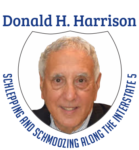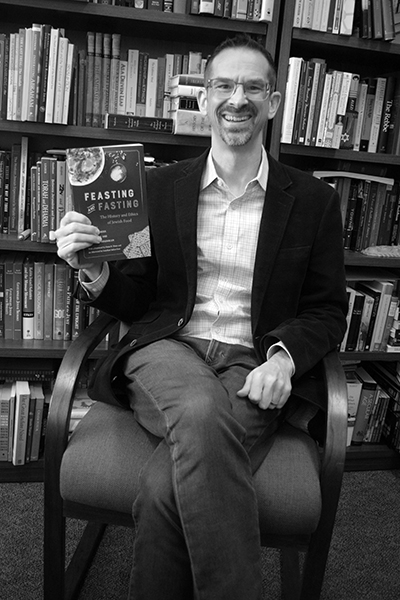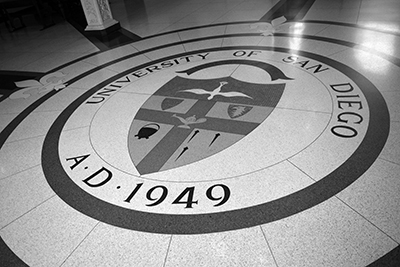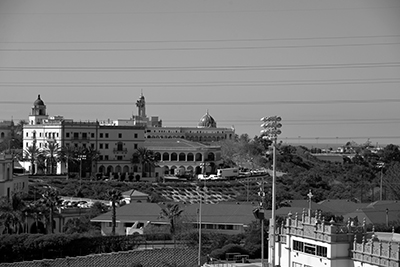Editor’s Note: This is the third chapter in Volume 2 of Editor Emeritus Donald H. Harrison’s 2022 trilogy, ‘Schlepping and Schmoozing Along the Interstate 5.’ All three books may be purchased from Amazon.com, or at any of the speeches that Harrison delivers to groups around the county. Harrison may be contacted via donald.harrison@sdjewishworld.com
 Schlepping and Schmoozing Along the Interstate 5, Vol. 2: Exit 21 (Tecolote Road) University of San Diego
Schlepping and Schmoozing Along the Interstate 5, Vol. 2: Exit 21 (Tecolote Road) University of San Diego
From northbound Interstate 5, turn right to Tecolote Road to a left on Morena Blvd. At Napa Street turn left, and then left gain onto Linda Vista Road. Then turn left onto USD’s Main Driveway at 5998 Alcala Park. The Department of Theology and Religious Studies is based in Maher Hall.

 SAN DIEGO — Professor Aaron Gross teaches Jewish studies at the University of San Diego. Besides being a de facto representative of the Jewish community at the Catholic-run university, Gross also carries an important volunteer portfolio. He is a spokesman for animals, most particularly for the many billions a year that are slaughtered to provide beef and poultry for Americans.
SAN DIEGO — Professor Aaron Gross teaches Jewish studies at the University of San Diego. Besides being a de facto representative of the Jewish community at the Catholic-run university, Gross also carries an important volunteer portfolio. He is a spokesman for animals, most particularly for the many billions a year that are slaughtered to provide beef and poultry for Americans.

The two roles were exercised by Gross in his capacity as an editor and contributor to the 2019 book of essays, Feasting and Fasting: The History and Ethics of Jewish Food, which grew out of a conference sponsored by the Leichtag Family Foundation in Encinitas. Gross also served as a consultant to the Museum of Us (formerly the Museum of Man) in Balboa Park, where he successfully urged the curator of a popular exhibition on the relationship between humans and animals to include some exhibits depicting the cruelty of factory farming. The exhibits illustrate hundreds of chickens being mechanically pushed to mass slaughter and cows being confined on a large lazy-Susan-type moving floor to undergo industrial-style milking.
“I think the single most important thing Jews can do if they want to reduce animal suffering, to practice the value of tzaar baalei Chayim, compassion for animals, is to reduce or altogether stop eating animal products,” says Gross, who is vegan. “Even if one still continues to eat meat when out and about, it makes sense for food to be more deliberate in Jewish communal settings, which I think should be places where we aspire to have our food represent the best of our values.”
Professor Gross said, “I agree with Rabbi Arthur Green when he wrote decades ago that vegetarianism is ‘a kashrut (kosher practice) for our age.’ To be precise, I would advocate for veganism as an ideal and meat reduction as an immediate practice. I think one of the most powerful moral exercises a Jewish community can undertake today is to truly ask what treatment of farmed animals is acceptable and to adjust their kosher or food policy accordingly. What anyone who investigates will find is that Jewish values – and here I mean mainstream Jewish values – are not consistent with the current practices in the meat, dairy, and egg industries.”
During an interview in his office that boasts floor-to-ceiling books along a long wall, and in follow-up email correspondence, Gross commented that “99% of animals raised for food in the U.S. are raised in industrial farms that no one would define as humane, and most of the Jewish (and larger American) community have simply failed to digest this reality.”
Gross said many Jews mistakenly assume that “kosher confers some animal welfare benefits. It perhaps should do so, but it does not – not even a little – today. Indeed, one of the major campaigns today of the Jewish Initiative for Animals (JIFA) at present is attacking the role that kosher plays in ‘humane-washing.’ More than 250 rabbis have recently raised their voice about the problem of kosher ‘humane-washing’ and this is something that makes me proud to be Jewish.”

Gross earned a master’s degree from Harvard Divinity School and doctorate from UC Santa Barbara. He recently celebrated his 13th year on a tenure track. During our conversation, he noted that there is no word in biblical Hebrew for “animals” that differentiates them from human beings. Throughout the Hebrew Bible, there are words or phrases that refer to “everything that lives,” “everything that breathes,” or to creation, but these terms include humans and animals in the same group.
“We have words for groups of animals in the water [fish], animals of the air [birds] and animals that are creepy crawlies [insects, reptiles, and amphibians] but there is no category that includes all of what we call animals that excludes humans,” he said.
In the Bible’s story of Creation, animals and humans are both created on the sixth day, and both receive a blessing to “be fruitful and multiply” – more evidence that in the biblical view, people and animals share in God’s high regard. In early Judaism, “nefesh (soul) is just a thing possessed by creatures, it is not exclusive to the humans,” Gross said.
On the other hand, ancient Greek, Roman, and Christian theologians distinguished between humans and other biological beings. “There is the argument that only humans have a soul and animals are essentially soulless creatures,” Gross reflected. “In the modern period that culminates in [philosopher René] Descartes’ thinking of animals as machines, which propels us into the modern era with the institutions we have today like industrial farming, where animals are completely without rights. There is no level of cruelty that can’t be visited upon them.”
Jewish thought became divided on this issue. Some thinkers like the medieval scholar Maimonides favored the concept of a fraternal relationship between humans and animals, while other Jewish philosophers adopted the Greco-Roman-Christian view that humans are in a class of their own, higher than animals.
An example of the divide may be found in discussions about the biblical commandment that before you take an egg from a bird nest, you must first shoo away the mother. Why? In the view of Maimonides, “that is because animal mothers suffer in the same way that human mothers do in distress, so we have to limit that by removing her from the site,” Gross explains.
On the other hand, Nachmanides, who was considered Maimonides’ biggest critic, suggested, according to Gross, that shooing away the mother bird “is about God requiring you to do something for the sake of transforming the human heart rather than primarily about relieving animal suffering.”
Rabbi Abraham Joshua Heschel “liked to describe Judaism as located between Athens and Jerusalem, meaning the Greco-Roman concepts that shaped rabbinic thought and biblical thought,” Gross said. “I would say that is what you would see in Jewish thinking about animals.”
Among some modern Jewish writers such as Franz Kafka and Isaac Bashevis Singer, ethical solidarity with animals is expressed in vegetarianism. Philosopher Peter Singer, an Australian who wrote Animal Liberation in the 1970s, “is credited with starting the animal rights movement,” Gross said. “Singer also wrote Pushing Time Away: My Grandfather and the Tragedy of Jewish Vienna about his Jewish heritage and how it sensitized him and propelled him into these issues.”

Gross, himself, went from being a hamburger-eating youth with an aversion to the idea of hunting to a full-fledged vegan adult, who tries to educate the public about the inherent cruelty of our mass-produced, industrially farmed foods. As a boy, he said, he believed hunting was wrong, but in conversations with other adolescents, he was unable to reconcile that view with the fact that he ate and enjoyed meat. After learning about industrialized farming from materials distributed by People for the Ethical Treatment of Animals (PETA) and other animal rights groups he decided to conform his diet with his conscience. In 2007, Gross founded an organization called “Farm Forward” to focus on the problems of industrial farming. In 2015, thanks to a grant from a donor, he became involved in the Jewish Institute for Animals, which educates people about the plight of animals.
In our discussion, I asked why in the Bible, God favored animal sacrifices if God were so opposed to killing animals. Gross paraphrased Maimonides as saying that the practice of animal sacrifice had come into the world and God wanted to wean our ancestors from the practice. He credited Professor Jacob Milgrom with pointing out that from the time of Noah, all species were permitted to be eaten but with Moses rules had been promulgated limiting the times, places, and kinds of species of animals that could be slaughtered. Under original rules of kashrut, slaughter had to be done in a certain way, and, “if you don’t, you can’t eat it.” The kashrut that had been practiced for centuries never anticipated the mechanized death machines that characterize industrial farms.
Even though God accepts animal sacrifices, the Bible offers other evidence “that God doesn’t want killing, that God abhors bloodshed, and wants it to be minimized,” Gross said.
“The creation story is one of the most powerful places to think about our relations with animals,” he instructed. “The Garden of Eden was completely vegetarian; there is no violence. This is something that we find again in Isaiah’s vision. The lion laying down with the lamb is not just a beautiful poetic image. It is a deliberate reference to an understanding of Genesis. It is what Jewish Studies school Michael Fishbane called ‘inner-biblical exegesis,’ where one part of the Bible is interpreting another. So, there is this vision … both in Genesis and in the prophetic writings of the very beginning and the very ending being times of harmony.”
The problems and ambivalence in Jewish thought come from the times between the beginning and the end.
After the Flood, when Noah and family were given permission to eat animals, God “prohibits consuming animals with their life blood in it, and that gets interpreted by the rabbis to mean that you have to drain the blood from animals before eating them, which we all do today,” Gross said. “Jacob Milgrom, who is a Conservative rabbi and one of the greatest Biblicists of our time, uses the phrase ‘reverence for life,’ which he takes from Albert Schweitzer, to interpret the deeper meaning of this biblical command.”
In essence, the prohibition tells humans, “you have to remember that the life of the animal really doesn’t belong to you; it belongs to God, so the pouring of the blood is a kind of returning the animals’ essence to God.”
In Gross’s view, philosophies that cast animals as lesser beings, upon which “no level of cruelty” is excessive “are part of the same worldview that makes it more likely that humans to be exploited in the most extreme ways imaginable, most notably African-Americans as slaves to be bought and bred, and Jews to be industrially murdered in the Holocaust.
The fact that Jews were transported to the killing camps in cattle cars symbolized the Nazis’ determination to create an equivalence between Jews and animals routinely led to slaughter. Isaac Bashevis Singer, a fellow vegetarian who Gross esteems, famously suggested that “for animals, it is an eternal Treblinka.”
“What we are doing to animals, the way we are thinking about them and conceptualizing them, has been art of how we constrain or expand violence,” Gross commented. “If we want to make a group more exploitable, animalization is the first way you do that.”
Our conversation turned to a topic covered earlier in this book, the white sea bass farm in Carlsbad that is operated by Hibbs SeaWorld Research Institute and the hope expressed by HSWRI’s President Don Kent that yellowtail may someday be farmed for miles out to sea in an effort to produce more food for an expanding world population.
Gross suggested that however genuinely Kent believes in that mission, industrial farming, whether it be of meat, poultry, or fish, is “the least efficient way to produce food.” He explained, “Since the 1970s there have been folks arguing that fish farming would reduce pressure on the oceans and could be an ecological tool … The fish farming that has a chance of not being obviously destructive is the farming of fish like tilapia, which are vegetarian fish.. Most of the farms that were proposed as tilapia farms went out of business; no one wants to eat that, it is not very tasty. So, they become salmon farms, which are extremely profitable. But salmon are carnivorous fish and to raise salmon in captivity, you have to capture wild fish; you have to capture five pounds of wild fish to produce one pound of salmon in captivity. So, it actually intensifies the pressures”
The professor suggested that to produce “good and inexpensive protein for people” scientists should look for “ways in which we can grow plants for consumption directly without having to spend all the money, resources and time to come up with a system which will probably be extremely fragile.” He added that today, “we ca do things with plant protein that we couldn’t do before which is to make it taste like an animal. So, if you were looking for an efficient way to produce protein around the world, you would do it with a plant-based protein.”
I asked if God created a world in which animals eat other animals, what is wrong with it.
“Suffering is wrong with it,” he responded. “I think the world is mysterious. Jewish tradition finds it mysterious. To me there is something a little arrogant imagining the order that we sew was everything that was intended. How to reconcile even the suffering in human life with God’s goodness can be tricky. Why make us get old and die? There are many things about the world that are mysterious to me and one of them Is carnivory. If God is benevolent, why create an order in which suffering seems to be built in? The defining feature of Judaism is always this prophetic voice, this notion that the world can be different that it is and that someday it can be far better than it is. Refusing to eat animal products is my way to express this Jewish hope for a world without violence.”